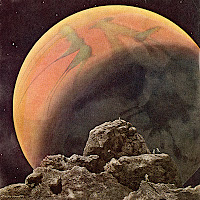
This, the third and last part of this strange account, is a follow up to an earlier jot.
January 15th. For the sake of those who, in spite of my gloomy experience on the whole, wish to make this voyage too, I should like to make the following observations on the equipment required for the expedition. A large quantity of provisions, as for an Arctic or Antarctic expedition for many years is a first requirement. It is quite easy to keep the provisions here owing to the permanently low temperature in the ground. If economically used, sufficient water can be obtained by melting hoar-frost.
As for
clothes---summer clothes are needed, if the tropics are to be visited, for the
few hot hours in the afternoon when the sun may really be very hot. For the
rest, the very thickest winter clothes are an imperative necessity. And also
cooking apparatus, and so on and so forth, just as for a Polar expedition. Fuel
is found on Mars in sufficient quantities. The dead, dried plants burn well,
and give a fair amount of heat. There is enough oxygen to allow of combustion.
For breathing purposes a number of first-rate
apparatus are needed. It is quite impossible, even in the fine perihelion days
in the tropics, to breathe freely in the open air. I tried to do so several
times but was invariably within suffocation in a very short time. A good diving
suit, with an apparatus to condense the air to the right degree, is a
necessity. I constructed an electrical apparatus that has given me great
satisfaction. It works with the aid of an accumulator battery that I carry
along with me (it is quite easy to carry a weight that would be a cumbersome
load on Earth) and that is filled by the engine of my aeroplane. An aeroplane
is the only practical means of travelling long distances here. There are
excellent, bare landing grounds almost everywhere. Of course, one’s entire
stock of petrol and oil must be taken from the Earth.
It is no good
having a compass here. On different points on Mars the needle points in
different directions. Apparently there is no magnetism on Mars, or else it is
too weak for an ordinary compass to respond to it.
As regards the
measurement of time, I serious advise you not to take an ordinary clock from
the Earth, or perhaps just one (of course not one with a pendulum) for the sake
of comparison. After I had been here for some months I altered my watch ( I am
a bit of a mechanic). It is most unpractical to measure time by terrestrial
clocks and by terrestrial hours. The Martian hours shift every day and give
rise to more and more difficulties. So, a
la Mars comme a la Mars. It’s best to divide one’s day so that it
corresponds with the Martian day. So the watch must be altered so as to make
the hour hand travel round once in 12 hours and 19 ½ minutes ( half a mean
solar day on Mars). And the minute hand and seconds hand accordingly. One then
count by days, hours, minutes and seconds that are about 3 per cent longer that
those on Earth; there are only advantages but no drawbacks. One does not even
notice the fact, and the great benefit of it is that it tallies with the sun as
seen from Mars. One’s pulse then makes a few beats more per minute, but that
really does not matter. The only thing that I found to be very odd, was that,
when I was once watching the Earth’s rotation through my telescope, I found
that a complete rotation lasted less than 23 ½ hours. I first attributed this
to a miscalculation on my part, until I remembered that I was using too long
hours and minutes!
With respect to the calendar, I also advise you to adapt it. If one holds on to terrestrial months it leads to the greatest confusion, especially if one uses Martian days. Hence, after some experience on the subject I arranged things as follows: the Martian year has 668 days (not counting the leap years). It has corresponding seasons, but with a considerably longer, be it much less hot, summer half-year( this applies to the Northern hemisphere. On Earth, we inhabitants of the Northern hemisphere associated winter with January, summer with July. Therefore I chose the following calendar, keeping the terrestrial names of the months.
| Southern hemisphere | Northern hemisphere | Days | Days | Days | Total |
| Autumn | Spring | April 64 | May 64 | June 63 | 191 |
| Winter | Summer | July 61 | Aug 60 | Sept 60 | 181 |
| Spring | Autumn | O 50 | Nov 50 | Dec 49 | 149 |
| Summer | Winter | Jan 49 | Feb | March | 147 |
| 668 |
